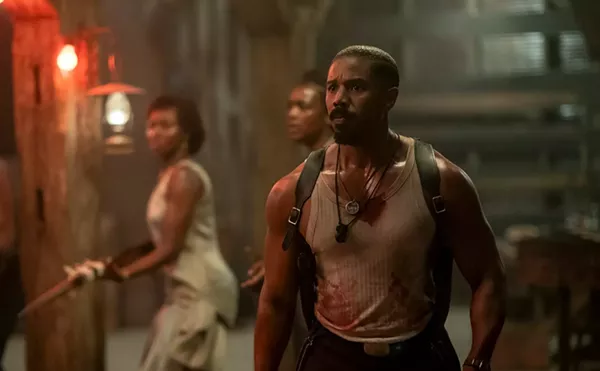Seven Psychopaths
Crazy good, almost — A struggling screenwriter gets roped into a world of violent insanity he usually faces on paper

Audio By Carbonatix
[
{
"name": "GPT - Leaderboard - Inline - Content",
"component": "35519556",
"insertPoint": "5th",
"startingPoint": "3",
"requiredCountToDisplay": "3",
"maxInsertions": 100,
"adList": [
{
"adPreset": "LeaderboardInline"
}
]
}
]

Seven Psychopaths| B
How meta can you get? Martin McDonagh is determined to find out in his demented, pulp riff on Tarantino-style faux gangster-noir. Threading together profanity-laced dialogue and splashes of bloody carnage with a plot that twists Luigi Pirandello's Six Characters in Search of an Author and Charlie Kaufman's Adaptation into a blood-soaked narrative bow, Seven Psychopaths layers on the meta-fiction thick and fast.
Colin Farrell is Marty, an Irish alcoholic screenwriter struggling to finish his script entitled "Seven Psychopaths" (do you see where this going?). Marty bemoans Hollywood's need for yet another hyper-violent guys-with-guns flick. Which is exactly the kind of movie his best pal Billy (Sam Rockwell) thinks he should be writing. Billy makes his living by kidnapping dogs with his dapper partner Hans (Christopher Walken). When the two inadvertently steal the beloved Shih Tzu of Charlie, a highly unstable crime boss (Woody Harrelson), Marty finds himself immersed in the same brutal, trigger-happy world he's rejected as a writer.
McDonagh's theatrical roots (The Beauty Queen of Leenane, The Pillowman, The Cripple of Inishman) are more than apparent in Seven Psychopaths, as the film frequently and gleefully digresses into extended monologues, stories within stories, and lengthy bouts of verbal irreverence. While the bloodshed is copious and unapologetic, no cultural reference or social issue is too sacred to fall into the script's crosshairs. Heck, even Gandhi takes it on the chin. It's what you'd expect from the filmmaker whose first feature, In Bruges, featured a coke-addled dwarf pontificating about the impending race riots to a pair of Belgian hookers. (Strangely, here, the Shih Tzu makes it out alive.)
Unfortunately, Seven Psychopaths can't maintain the fevered pitch and inspired cleverness of its best moments. There's simply too much going on, too many subplots and supporting players to juggle. While Tom Waits nearly steals the show in a pair of tangential scenes, Abbie Cornish and Olga Kurylenko are essentially throwaway girlfriends, sad proof that women are not only ignored in most Hollywood thrillers but often insulted and brutalized. McDonagh is self-aware and self-deprecating enough to cleverly echo this point, but not savvy enough to actually do anything with the revelation.
His movie also lacks resonance. It's not that I expect the film's series of smartass nesting dolls to deliver a profoundly emotional experience. His characters are outrageously conceived caricatures for a reason. But in commenting on Hollywood's shallow and gratuitous use of violence (Rockwell's fantasy of what his final showdown should look like is a psychotic hoot), Seven Psychopaths tries to hold up Farrell's Marty and Walken's Hans as the pacifist response to genre demands. It's a noble conceit, but without a deeper connection to either character the message doesn't hit home the way it should.
Still, as you might expect with a cast like this, McDonagh has struck gold. Rockwell is a maniacal force of nature, in turns psychotic then sincere. The actor is clearly having the time of his life, and his live-wire exuberance is infectious. Walken's world-weary melancholy and unassuming charm is the perfect counterbalance, providing the movie with what little soul it has. Farrell, who could have easily been overshadowed by both, stands his ground, finding both humor and empathy in his underwritten straight man.
Deconstructing itself as the story plays out, Seven Psychopaths esteems to be more than just a movie within a movie that becomes the movie we're watching. I think McDonagh is expressing his personal misgivings about the kind of violence audiences and the film industry expect. Although In Bruges certainly wasn't shy when it came to depicting acts of brutality, its foundation was built on moral guilt and personal responsibility. While McDonagh's choice to put comedy before commentary may make Seven Psychopaths an entertaining experience, he has traded weight for wit and substance for silliness. The ending is hardly a thesis statement on violence in movies, but McDonagh's point is crystal clear.





